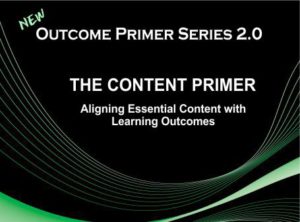The CONTENT Primer: Aligning Essential Content with Learning Outcomes
By: Ruth Stiehl and Michele Decker
| PREFACE: The OUTCOME Primers Series 2.0 | ||
| Once a Fad — Now a Fact! | xi | |
| Distinguishing Our Work | xii | |
| PART ONE: The Importance of Analyzing Outcomes First | ||
| Analyzing the intended learning outcomes to determine the essential content is one of the important marks of a strong curriculum. | ||
| Introduction | 3 | |
| Designing Backwards — Outside In | 3 | |
| PART TWO: Learning from the Past, Moving into the Future | ||
| The future belongs to a very different kind of person with a very different kind of mind— creators and empathizers, pattern recognizers, and meaning makers. — Daniel Pink | ||
| A Paradigm Shift: The Place of Conceptual Learning in an Outcome-Based Model | 11 | |
| A Case in Point: Nursing Studies | 13 | |
| Topics vs Outcomes | 13 | |
| PART THREE: Distinguishing Concepts, Issues and Skills | ||
| An inch deep and a mile wide —Schmidt, McKnight and Raizen | ||
| The Consequences of Information Overload | 21 | |
| Expressing Content as Concepts, Issues and Skills | 23 | |
| Posting Content onto the Outcome Guide: Pogging, Cogging and Wogging | 28 | |
| What Concepts Must Your Learners Understand? | 32 | |
| What Issues Must Your Learners Resolve? | 35 | |
| What Skills Must Your Learners Develop? | 37 | |
| What Does a Good Outcome Guide Look Like? | 43 | |
| Determining Essential Content: A Facilitator’s Guide | 49 | |
| PART FOUR: Continuing Your Learning | ||
| Tell me, and I will forget Show me, and I may remember Involve me, and I will understand — Confucius, 450 BC | ||
| In Conclusion | 67 | |
| Next Steps | 67 | |
| Appendix A: Sample POGs, COGs, and WOGs | 71 | |
| Appendix B: Our Preferred Terms for Determining Essential Content | 87 | |
| Related Readings | 91 | |
| Acknowledgments | 95 | |
| About the Authors | 96 | |


